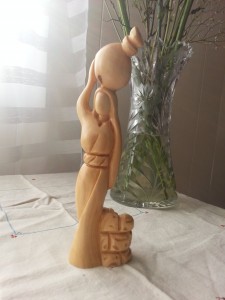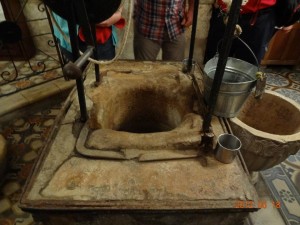Sermon – March 30, 2014
The Rev. Rebecca S. Myers, CSW
St. John’s Episcopal Church, Corbin, KY
Fourth Sunday in Lent
I have told you already, and you would not listen. John 9:27
Please be seated.
The physical act of seeing is a tricky thing. When I was on the School Board in Harrisburg, a man came to give us a presentation about quality improvement. Part of the presentation was a movie. I can’t remember the name of the movie, but I have never forgotten one of the parts of that movie. It showed a person dealing cards very quickly. The action happened twice and we were told to look very carefully. It was just a hand dealing cards. Then they slowed down the action and it turned out all of the colors of each suit were reversed, so the hearts and diamonds were black and the spades and clubs were red! It was astounding to know that I refused to see the reality, because it conflicted with all of my experience and belief.
We see that in our Gospel story today, don’t we? Jesus challenges the worldview of an entire community by healing a man who was blind from birth. The people in the town have a difficult time accepting this miracle. It does not fit in with what they know. It conflicts with their experience and belief. Instead of rejoicing with the man, they debate and work hard to deny what has occurred.
Yesterday, a group of us gathered in the parish hall for training on Ministry Support Teams. These are teams set up in Network parishes to support the Priest-in-Charge. People and priests from Emanuel, Winchester and St. Mary’s, Middlesboro were also at the training. One piece of the training was about the difference between debate and dialogue.
Now, just in the words, there is a fundamental difference. The word “debate” comes from a French word meaning to fight or to beat down. Dialogue goes back to Latin and Greek meaning to “speak through” or “through words.”
The goal of debate is to win against your opponent. In a debate, when you listen, it is only to counter what the other person says, to find the weakness in the argument, especially so you can discount and devalue it. In debate, you make assumptions about another person’s experience and motivations. At the very beginning of the Gospel, the disciples, speaking in the worldview of their time, ask Jesus, “who sinned, this man or his parents….?” The assumption was that sin was the cause of the man’s blindness. Because Jesus healed on the Sabbath, some discounted the healing, saying it was not from God.
In debate you ask questions to trip up your opponent or confuse them on the issue. This happened to Jesus a lot. In debate, you interrupt the other speaker or change the subject. You are not concerned about the person, but only about your next point. You deny the other person’s experience, saying it is distorted or invalid. Look at our story today where people continually ask the man who had been blind how he was healed. He had to keep telling them the story. His parents were called in to authenticate his identity. When the man insists on what occurred…on his experience, they drive him out of the town.
Why do we insist on debate, instead of dialogue? Kathryn Schulz studied why we as humans insist that our way of looking at things is right…why we have such trouble admitting when we are wrong. She wrote a book, Being Wrong. She also has a TED talk online. One of the things she says is that early in life, we internalize that “getting something wrong means there’s something wrong with us. So we just insist that we’re right, because it makes us feel smart and responsible and virtuous and safe.” (http://www.ted.com/talks/kathryn_schulz_on_being_wrong/transcript) She says we live in this “tiny, terrified space of rightness.” Our love of debate is about being in this “tiny, terrified space of rightness.”
Where we need to be, and truly where we have tremendous capacity to be…where Jesus calls us to be…is in dialogue. The goal of dialogue is an increased understanding of ourselves and of others. When we listen, we’re trying to understand the other person. We listen for strengths to affirm the other person and to learn. We speak from our own experience and understanding, rather than from the assumptions we’ve made about others. We ask questions to increase understanding. We allow others to complete their communications. We concentrate on the other person’s words and feelings. We accept others’ experiences as real and valid for them. We respect and are open to how the other person expresses their real feelings and how we express our feelings as a way of understanding and catharsis.
In our Gospel today, the man who had been blind is engaging in dialogue, while those around him are engaging in debate. The man’s experience is so powerful, he is thrust out of the “tiny, terrified space of rightness,” probably the space he had been living in, to a new place. That’s the power of dialogue. Dialogue can transform us. Dialogue makes us grow. Dialogue changes everyone who is involved in the discussion. It opens us up.
In dialogue we honor our own experiences as valid; we trust others to respect our differences; we trust ourselves to be able to hear different points of view; we open ourselves up to the pain of others, as well as the pain we feel ourselves; we see Christ in others.
When we are in dialogue, we can grow. We can agree to disagree – to know that we can look at the same facts or situation and come to different conclusions or slightly different places, yet still be in community together…to still be in communion with each other.
That’s what Jesus asks. We come with our assumptions about life. With the way things are supposed to be and Jesus says, “consider this.” Look at the world in a new way. Don’t debate me, but be in dialogue with me…in connection with me, he pleads. The man who was blind remains in dialogue with Jesus. He is open. Jesus asks him whether he believes in the Son of Man and the man who had been blind, asks a question to learn more. Receiving an answer, he professes his belief.
In Ephesians, the writer provides us with the fruits of dialogue, “but now in the Lord you are light.” We are light to the world. When we can leave debate behind and engage in dialogue, we are transformed and live as children of the light.
Amen


